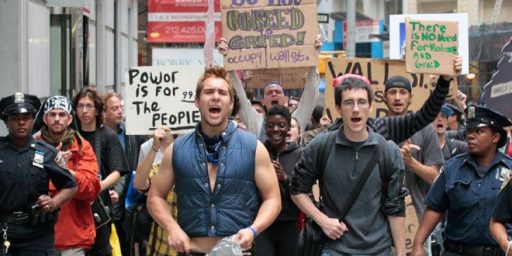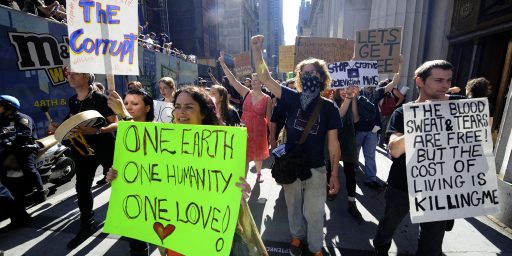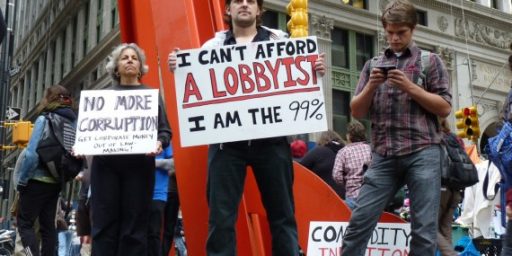The Tea Party Surrender On Corporate Welfare
The Tea Party flame was lit by the battle over TARP, but they quickly forgot about those bailouts that supposedly upset them so much.
Scott Galupo laments the fact that the Tea Party, founded as it was in reaction to the TARP bailouts and the Obama Administration’s proposed mortgage bailouts, has essentially given up on the idea of taking crony capitalism:
In her Iowa speech last month, former Gov. Sarah Palin offered a fleeting glimpse of what the Tea Party was supposed to represent—a transpartisan attack on the bosom buddies Big Government and Big Business. More recently, Conor Friedersdorf muses quixotically about what a potential Tea Party-Occupy Wall Street alliance would look like.
The problem is Tea Partyers, as conventional conservatives, were never intellectually prepared to deliver on this threat. There’d been talk about ending corporate welfare in Republican circles for years. The TARP bailouts added a powerful new ingredient to this critique.
But when it came down to it, what did Wall Street and corporate America ever have to fear from the Tea Party? Lower corporate taxes and regulatory rollback? Seriously?
If CEO types truly fear a freer free market, why do they constantly complain on the shout shows of being “handcuffed” by Washington? And for crying out loud, didn’t I watch the Tea Party movement go viral on the floor of the Chicago Board of Trade?
The Tea Party, ultimately, had nothing new to say.
I can’t really say that Galupo is wrong here. For whatever reason, the Tea Party left behind the outrage against bailouts long ago and has backed candidates, like Rick Perry, who made their political careers based on crony capitalism disguised as state “economic development” funds. Perhaps it all started when a movement that had its roots in Ron Paul’s renegade campaign for the Presidency in 2008 was, inevitably one might argue, co-opted by mainline Republicans many of whom had stood on the sidelines in silence during the eight years of fiscal profligacy known as the Bush Administration. Instead of becoming a real movement against the incestuous relationship between government and business, it turned into a movement directed primarily at opposing Barack Obama.
It’s hard to argue with that particular strategy given the fact that it turned out to be remarkably successful in 2010, and may well yet succeed in 2012. However, it strikes me that the original goals of the Tea Party aren’t all that different from some of the things we’re hearing from “Occupy Wall Street” and it’s progeny. The public reaction to TARP was, at it’s core, a reaction against the idea that the government should be bailing any entity out for the mistakes that it made. The same attitude could be found in public opinion regarding the bailouts of Chrysler and General Motors, a decision that was first made by George W. Bush despite the refusal of Congress to approve any form of government aid at all. In both cases, politically connected corporations were able to convince the powers-that-be to use taxpayer dollars to bail them out for their own mistakes, and then turned around a year later and handed out lavish bonuses to the very people responsible for making the bad decisions that got them in trouble. The public outrage was real, and the Tea Party utterly failed to capitalize on it.
In the end, I doubt that “Occupy Wall Street” will be any more successful at attacking this monster than the Tea Party was. For one thing, they seem to be far to tied up with the kind of intellectually lazy anti-capitalism that may play well in a college dorm bull session but has always been a non-starter in American politics. For another, they don’t really seem all that interested in actually effecting political change. But that’s a topic for another day. We’ve got a president who just raised $70,000,000, much of it thanks to connections with the very banks and corporations that the “Occupy Wall Street” crowd is protesting against, and we’ve got an opposition that seems more concerned with winning than actually doing anything. Regardless of who wins in 2012, corporate welfare and crony capitalism will continue to exist in full force, and the American taxpayer will continue to pay the bill.






I can’t think of anything lazier than throwing out a pejorative without an accompanying argument.
I can think of one thing lazier, and that’s the implicit ad hominem in this statement.
I think that the Tea Party rage about TARP was as much about spending in general (and the taxes that pay for it) than it was about corporate welfare, per se.
Further, the conservative base tends to be pro-corporations and think that anything in the business realm=free market capitalism.
Let’s be honest. TARP was never anything more than a pretext for right wing rage about the economy. It was a symbol that allowed middle class Republicans to deny that the candidates they cheered for and the policies they supported had anything to do with the 2008 economic crisis. Then Barack Obama came along and was a much better target for all that denial. End of story.
Mike
To quote Doug on another thread, “I’m wrong? Oh well”
The long term capital gains tax is scheduled to go up to 20% starting in 2013.
And the Bush tax cuts will expire then, too.
It’s hard to see either of these tax breaks being extended if people are still marching in the streets.
They have simply been redirected by their puppet masters, the Koch brothers and Dick Armey. Not all of them all – you will find them represented at the OWS demonstrations.
This is total donkey poop and it shall be considered unacceptable…..
The Tea Party never has been anything but Social Conservatives teaming together under a different name than “Christian Coalition” to reach the same ends:
Anti-Abortion? Check.
Anti-Gay Marriage? Check.
Against repealing “Don’t Ask, Don’t Tell?” Check.
Against Planned Parenthood? Check.
Against a belief in Climate Change? Check.
For teaching Creationism in the Schools? Check.
Against improving Health Care in the country? Check.
For Corporations as opposed to Citizens? Check
The Tea Party is nothing other than a re-branding of the GOP to capture a few more center-right citizens. That they could focus all their rage at the country’s first (half) African-American President was a bonus.
This is total donkey poop and it shall be considered unacceptable…..
Most conservatives in the US aren’t actually capitalists, they’re mercantilists. The problem is that as the movement has become increasingly more about identity politics rather than political philosophy, most of them don’t have the intellectual background to understand the distinction.
So we’re stuck with a party that’s anti-business and one that’s pro-business and nobody is pro-market.
@Stormy Dragon:
Actually, both are pretty pro-business. Our politics, in general, are pro-business.
@Steven L. Taylor:
Well, rhetorically pro- and anti- business, if not in action.
What better way is there to increase your profits than to have the government eliminate your competition?
I never really figured the tea party beliefs to even start overlapping with OWS. Remember the financial reform bill? The tea party wasn’t too involved either way on that, but they certainly weren’t pushing the GOP to actively negotiate and cooperate in passing anything. The tea party is the GOP base, their positions and faux outrages are plenty predictable.
for whatever reason? seriously? the reason they left it all behind is that they were never really motivated by corporate excess. what motivated them was a democrat in the white house. it was a rebranding effort, and it worked perfectly.
I’d say that’s about right.
We stand firm in our beliefs in…Oh look, shiny.
@ponce: Especially when you’ve convinced everyone that eliminating that competition (or at the very least protecting the established players) is being pro-market and that anything to the contrary is commu-social-fascist.
@rodney dill: Ha. Heh. Heha. Too accurate.
The Tea Party??
@CJ Robinson:
According to the NYT, 98 percent of Obama’s donors from last quarter gave $250 or less, with an average donation of $56. So, this statement is complete fabrication.
@Steven L. Taylor:
Our politics, in general, have been bought by business. Also, your 53% post was excellent.
Everything EddieInCA said.
Perhaps you can document this? Or are you just passing along the party line from Fox?
@Scott F.: Yeah, NYT is a reliable source.